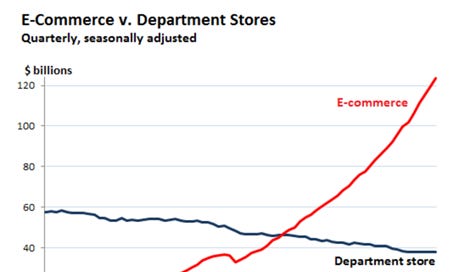For those that cannot imagine a new world order with crypto and blockchain at its core, let me present to you a few flippenings that already happened, one that you’ve already witnessed, and a couple that will be obvious after I tell you.
Why these flippenings matter is because it can help us frame the discussion on new developments and show you the speed and magnitude of where they can go. Based on these charts, I want to say I’ve been utterly wrong about crypto.
How utterly wrong? By a factor of 10.
· I thought that as a technology, being a world class method of payment and store of value, it was worth about the total market cap of gold. (~$7 Trillion)
· There are also recognized uses of NFTs as being able to represent real world assets, eating into existing market share of financial incumbents would round that out to $10 Trillion.
· But I completely missed how new methods of operating fundamentally changes how the economy functions at its core.
How do these things change? No one knows exactly, but we’ve seen something similar before… But first, the flippenings.
E-Commerce
The most salient example on everyone’s mind is probably the “internet”. I don’t know exactly how big Amazon’s contribution is to this chart, but the flippening is clear as night and day:
Basically, in the span of less than 10 years, E-commerce has achieved parity with brick and mortar stores. It didn’t “level off” afterwards but instead accelerated, growing by another 2x in the following 10 years.
Energy
Ok, sure but that’s the “fast moving” internet. No other industry grows as fast… Well, how bout a stodgy industry like power generation? Energy generation by coal, the biggest share of energy in the U.S. until recently, got cut by ½ in the span of 10 years. A billion megawatthours.
The Original Store of Value
The previous two examples are peanuts compared to this last example. But Ivan, the internet and energy are both big deals, how can you top that?
I’m talking about something so big that it impacts everyone’s life’s not only on a daily basis, and it’s reverberations are felt the world over. When it flipped, it caused dramatic changes in the architecture of the economy yet it happened without so much as a whimper (or pitch forks for that matter).
What I’m talking about, is the flippening of formerly the largest economic force in the US, now relegated to a “de minimis” portion the economy. That’s right folks, if you’ve guessed it, I’m talking about – agriculture.
One chart says it all. Between 1900 and 1940, Farm labor went from the largest group in the labor force to a minor one, becoming second to manufacturing, and barely squeezing out the trades. Not only did this happen within 40 years, what we saw is an acceleration of the pace of transformation after 1810, when manufacturing first became “a thing”. Decades AFTER the Second Industrial Revolution, this trend continued unabated until today where it makes up less than 1% of the labor force.
Source: NBER https://www.nber.org/system/files/chapters/c1567/c1567.pdf
This change has been so dramatic that even many seasoned financial professionals do not know why the biggest monthly economic data release is called the “non-farm payrolls”! Manufacturing was the OG disruptive force. Imagine a future where economic reports are grouped by “IRL” and “Non-IRL” industries. What would that look like?
My 10X Error
This brings me to the last point: the value of crypto and blockchain that we can “see” already points to a market that is going to be in the 14 figures (10s of Trillions). What are the things that we can’t foresee? How can I forecast that? Do we have any precedent?
Why yes we do! I bring you, the internet v0.1, what I’d like to call the “internet of energy”, aka electricity. According to (Devine, Jr. 1983) The process of electrification was a multi decade process. The first early adopters of electricity simply replaced their steam engine with electricity, but the factory floor with all those belts and shafts were still organized for a work process aligned with having one “giant motor” at the source of the power. It took a while for people to figure out how to best use electricity and I quote: “Some engineers even held ‘the extreme view… that a motor should be applied to every tool.’”
I hold the extreme view, that in the future, everything of import will be done on a blockchain. What’s the value of that?





